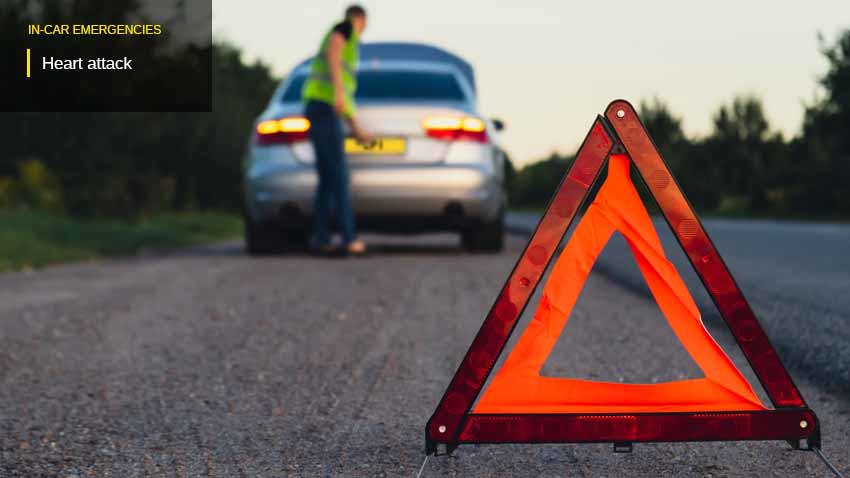
One of Regtransfers' aims is to provide helpful and informative content related to cars and motoring: that includes information on matters of health and safety.
This series of In-car Emergencies articles collates and curates information and advice from official sources such as the government and the NHS as well as other, bona fide authorities, including major charities and academic organisations.
A few numbers
The British Heart Foundation says that around 100,000 people are admitted to hospital every year with heart attacks. That's about 290 people a day, or one person every five minutes.
NHS England says that, overall, around seven out of 10 people survive a heart attack. That survival figure increases to more than nine out of 10 for those who reach hospital early to receive treatment.
7.6 million people in the UK are living with heart and circulatory diseases. Nationally, it is one of the largest causes of premature death.
In light of the substantial number of people affected, it makes sense for as many of us as possible to be familiar with the symptoms of a heart attack, and to know how to assist someone who may be experiencing one.
Symptoms of a heart attack
Heart attacks don't just happen to people who are old or overweight, and a heart attack does not always manifest in the form we commonly imagine or see on TV. While chest pain is a common symptom, it is not always present, and there are many other signs to consider.
NHS England lists the following possible symptoms of a heart attack.
- A feeling of pain, pressure, heaviness, tightness or squeezing across your chest
- pain in other parts of the body – such as in the arms (usually the left arm, but it can affect both arms), jaw, neck, back and tummy
- feeling lightheaded or dizzy
- Sweating
- shortness of breath
- feeling sick (nausea) or being sick (vomiting)
- an overwhelming feeling of anxiety (similar to a panic attack)
- coughing or wheezing
These are possible symptoms, but some of them may not be apparent in some cases. Just because one or more of these symptoms doesn't seem to be present, it is not safe to simply assume that there is no heart attack. If in doubt, call 999.
Heart conditions and driving
If you have been diagnosed with a heart condition, you should seek advice about whether or not you should drive. Furthermore, as a driver, you are legally obliged to notify both the DVLA and your insurer if you develop a medical condition that is on the official list of conditions drivers must disclose, or if your condition changes.
Some conditions must be disclosed by all driving licence holders, while others only need to be disclosed if you hold a bus, coach or lorry licence. The official list linked above includes details of who needs to report which conditions.
Prevention is best
This basic rule of self-care definitely applies to in-car heart attacks. Sudden illness while driving presents a very serious hazard to other road users, as well as to the person who becomes unwell. Loss of control due to illness causes many fatal accidents.
Here are a few tips aimed at minimising the risks of a heart attack while driving.
- If you suspect you may have a heart condition, or if you have noticed symptoms that may suggest a heart or circulatory issue, get checked by your doctor. Chest pains, irregular heartbeat, dizziness or fainting, shortness of breath and other symptoms should be investigated.
- If you are diagnosed with a medical condition, check the list linked above and inform DVLA and your insurance company if your condition is on the list. This is a legal responsibility.
- Even if DVLA doesn't suspend or withdraw your licence, if you are told by a doctor that you shouldn't drive, then don't drive.
- A study reported by The New York Times in 2004 showed that sitting in traffic could nearly triple someone's risk of suffering a heart attack. If you have a heart condition, avoid driving or queueing in heavy traffic. If you have to drive, remain calm and avoid stress.
- If you have medication prescribed for a heart condition, make sure you take it as directed. Don't miss or delay regular medication. If you have medication to be administered in the event of symptoms of angina, heart attack etc, make sure you have that medication with you when driving.
- If you feel unwell while driving, stop your vehicle somewhere safe and call for help. Make sure you carry your phone and that you keep it charged.
What to do in case of a heart attack while in a vehicle
If you are taken ill while driving alone
- If you feel suddenly unwell when driving, move off the carriageway as soon as you can safely do so. Stop your vehicle in as safe a place as possible, where it will not obstruct other drivers, and call for help. Make sure you carry your phone and that you keep it charged.
- Try to remain calm and don't panic.
- If you suspect you may be having a heart attack, call 999 immediately. Time is key to minimising the damage caused by a heart attack. Stay on the line unless the 999 operator tells you otherwise.
- If you have medication prescribed for the situation, such as tablets or a spray, take it as directed. If you have aspirin, are not allergic to it and have not been told to avoid taking aspirin, then you may chew an aspirin. The maximum dose you should take is 300mg, which is a usual dose contained in one over-the-counter aspirin tablet.
- Tell the 999 operator and any attending paramedics or medical professionals about any medication you have or have taken.
- Rest while waiting for the ambulance: do not try to walk around.
- Do not try to drive yourself to hospital.
If someone else in the vehicle is taken ill
- Whoever is driving should move off the carriageway as soon as they can safely do so. Stop the vehicle in as safe a place as possible, where it will not obstruct other drivers, and call for help.
- If the affected person displays symptoms of a possible heart attack, call 999 immediately. Time is key to minimising the damage caused by a heart attack. Stay on the line unless the 999 operator tells you otherwise.
- If the patient has medication prescribed for the situation, such as tablets or a spray, allow/help them to take it as directed. If aspirin is available, the patient is not allergic to it and has not been told to avoid taking aspirin, then they may chew an aspirin. The maximum dose that should be taken is 300mg, which is a usual dose contained in one over-the-counter aspirin tablet.
- Tell the 999 operator and any attending paramedics or medical professionals about any medication the patient has with them, or has taken.
- Keep the patient calm and reassured. Encourage them to rest while waiting for the ambulance. They should not try to walk around.
- Do not allow the affected person to drive, not even to hospital.
- If the patient becomes unresponsive, inform the 999 operator. If the patient stops breathing or breathes abnormally, in gasps, administer CPR unless the 999 operator tells you otherwise.
Additional information and resources
Sources
https://www.gov.uk/guidance/the-highway-code/annex-7-first-aid-on-the-road
https://www.gov.uk/health-conditions-and-driving/find-condition-a-to-z
https://www.redcross.org.uk/first-aid/learn-first-aid/heart-attack
https://www.sja.org.uk/get-advice/first-aid-advice/unresponsive-casualty/how-to-do-cpr-on-an-adult/
https://www.nhs.uk/conditions/first-aid/after-an-accident/
https://www.bhf.org.uk/-/media/files/for-professionals/research/heart-statistics/bhf-cvd-statistics-uk-factsheet.pdf
https://www.england.nhs.uk/2023/09/nearly-1-in-2-adults-in-england-do-not-feel-confident-in-spotting-signs-of-a-heart-attack/
